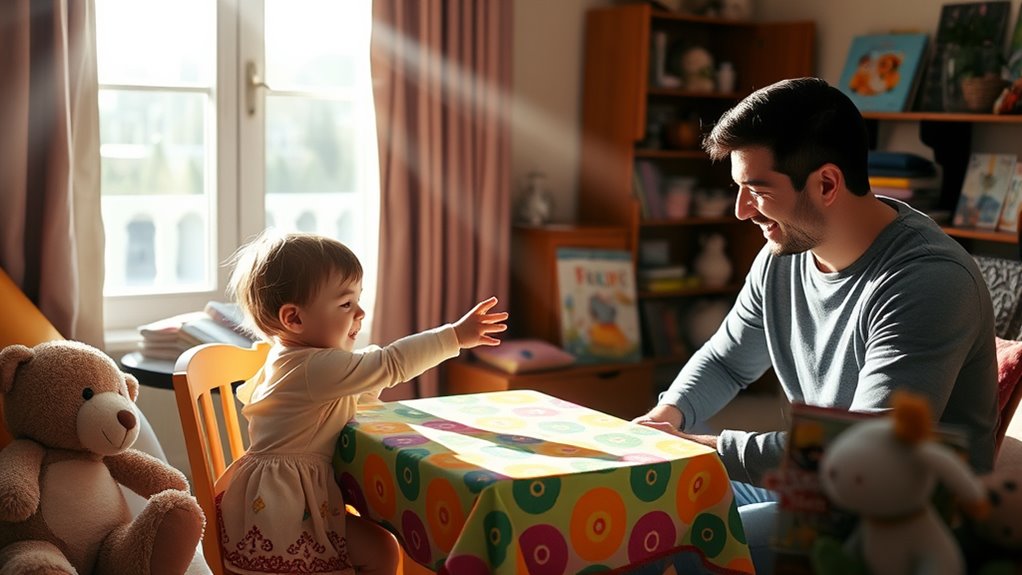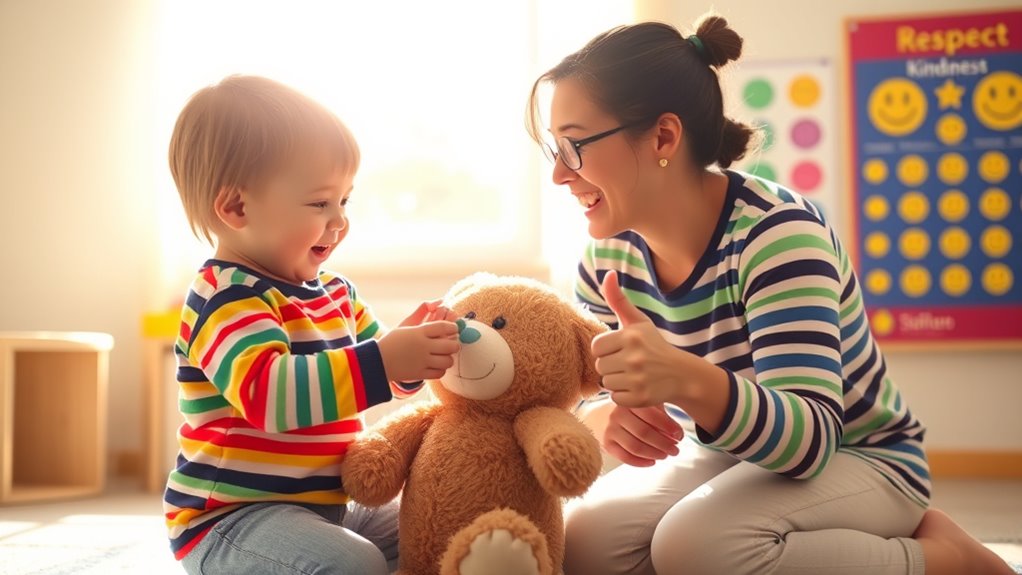Teaching toddlers manners is essential for fostering respect and empathy. Start by modeling good behavior with polite language and consistent reinforcement. Engage them in role-playing and practical activities like tea parties to practice social skills. Set clear expectations and celebrate acts of kindness to help them understand the importance of empathy. Utilize interactive resources to make learning enjoyable. With these strategies, you’ll nurture a compassionate mindset, and there’s so much more to explore about this journey!
Key Takeaways
- Model polite language and good behavior consistently to encourage toddlers to imitate these actions.
- Engage in role-playing activities to practice respectful communication and social skills.
- Use positive reinforcement, such as praise and small rewards, to shape understanding of manners.
- Incorporate engaging stories and media that highlight the importance of politeness and respect.
- Foster emotional expression through open communication, helping children connect feelings with respectful behavior.

Sesame Street Elmo Manners Books for Kids, Toddlers – Set of 8 Manners Educational Storybooks for Boys and Girls Featuring Elmo, Big Bird, Cookie Monster, More
Sesame Street Elmo "My First" manners books set for kids and toddlers, featuring Elmo and friends in 8…
As an affiliate, we earn on qualifying purchases.
As an affiliate, we earn on qualifying purchases.
The Importance of Teaching Gratitude

When you teach your toddler gratitude, you’re not just instilling a polite habit; you’re laying the foundation for their emotional and social development.
Gratitude is a high-level concept that can be challenging for young children, but it’s essential for their well-being. Starting around age 2, toddlers begin expressing thanks, and by ages 3 to 5, they grasp deeper meanings of appreciation. This early development of gratitude aligns with fostering emotional well-being, which is crucial for their growth. Engaging in effective relaxation techniques can also help children learn to appreciate the present moment and reduce stress. Furthermore, cultivating curiosity as a success tool in their play and interactions can enhance their understanding of gratitude.
Fostering gratitude helps them become more empathetic, resilient, and less stressed. Grateful children show kindness and generosity, leading to better relationships and overall happiness.
Practicing gratitude reduces anxiety and promotes emotional well-being, setting the stage for positive life outcomes. By teaching gratitude early, you’re helping your child thrive in life and build a strong foundation for their future. Additionally, engaging in transformative practices can further enhance their capacity for appreciation and emotional growth.

Learning Resources All About Me Feelings Activity Set – Emotional Regulation Tools for Kids, Preschool Classroom Must Haves, Social Skills Activities, People Figurines, Toddler Emotions Gifts
EMOTIONAL INTELLIGENCE DEVELOPMENT – Help children identify and express their feelings with 36 colorful figurines representing 6 key…
As an affiliate, we earn on qualifying purchases.
As an affiliate, we earn on qualifying purchases.
Modeling Good Behavior for Children

Modeling good behavior is essential for shaping your toddler’s understanding of manners and social interactions. Children learn by observing you, so your actions speak volumes. When you consistently demonstrate polite language and respect for others, your child is likely to imitate those behaviors.
Positive reinforcement, like praise, helps reinforce good manners, encouraging your toddler to repeat them. Remember, your social environment influences their behavior too, so be mindful of interactions in various settings, including media exposure. Additionally, teaching sleep solutions for new parents can help create a calm atmosphere conducive to learning and practicing manners. Consistent sleep routines can contribute to better emotional regulation, fostering emotional well-being in your child. Engaging in digital literacy programs can also provide opportunities for positive social interactions as your child learns to communicate effectively. Research indicates that hydration is also vital for maintaining focus and emotional stability in children, which can enhance their ability to learn and practice manners.
Positive reinforcement and a mindful social environment are crucial for nurturing your toddler’s good manners and behaviors.
Role-playing different scenarios can also help your child practice good manners effectively. By explaining the reasons behind these behaviors, you enhance their understanding and motivation. Additionally, fostering emotional and psychological growth through these interactions contributes to your child’s overall development.
Consistency across situations is key to making these lessons stick, effectively guiding your child’s development.

My First Gratitude Journal: Fun and Fast Ways for Kids to Give Daily Thanks
As an affiliate, we earn on qualifying purchases.
As an affiliate, we earn on qualifying purchases.
Engaging in Practical Social Skills Activities

Engaging in practical social skills activities is a fun and effective way to help toddlers develop essential manners and communication abilities.
Role-playing with dolls or stuffed animals allows your child to practice respectful communication in a safe setting. Additionally, using Montessori toys can enhance the role-playing experience by fostering imaginative play. Incorporating necessary cookies into your child’s playtime can help create a secure environment for their social learning. To further enrich the play experience, consider integrating educational toys that encourage interaction and cooperative play. Creating a supportive community can also benefit children’s social development, as they learn from observing others.
Turn-taking games, like passing a ball, teach patience and cooperation while enhancing social interaction.
Movement-based activities such as “Simon Says” improve listening skills and impulse control.
Creative projects, like arts and crafts, encourage collaboration and expression of emotions.
Finally, puppet shows and storytelling foster communication skills and provide a platform to discuss social issues. Additionally, incorporating emotional expression into these activities can help children process their feelings and develop empathy towards others.

Kenson Kids “I Can Do It!” Token Board. Colorful Magnetic Rewards Chart with Positive-Reinforcement Stars and Customizable Goal Box. Great for Ages 3-10. Measures 5-Inches by 11-Inches
PROMOTES GOOD HABITS THROUGH POSITIVE REINFORCEMENT – For years parenting books have been stressing the benefits of motivating…
As an affiliate, we earn on qualifying purchases.
As an affiliate, we earn on qualifying purchases.
Setting Clear Expectations and Boundaries

Setting clear expectations and boundaries is essential for teaching toddlers good manners. Start by modeling appropriate behavior yourself; use “please” and “thank you” consistently.
Explain why manners matter, making the lessons meaningful. Set achievable goals since perfection isn’t realistic for toddlers, and give regular reminders to practice good manners. Additionally, emotional damage from poor manners can mirror the consequences of infidelity in relationships. Using tea accessories during family tea time can create a fun and engaging atmosphere for practicing these manners.
Establish clear rules about how everyone should be treated at home, and enforce these boundaries consistently. When misbehavior occurs, focus on positive reinforcement by praising good behavior.
Establishing clear rules and consistently enforcing boundaries fosters respect and encourages positive behavior in toddlers.
Use simple language to communicate your expectations, and encourage participation in polite interactions. Redirect behavior when necessary and maintain a positive tone during corrections.
Creating a supportive environment will help your toddler learn and embrace good manners effectively. Additionally, fostering good manners can help prevent financial scams later in life by encouraging respectful communication and awareness of others’ intentions.
Fostering Empathy and Kindness in Daily Interactions

Although toddlers are naturally self-centered, nurturing empathy and kindness in daily interactions can greatly shape their social development. Start by discussing emotions during playtime, helping them build an emotional vocabulary. Additionally, teach them the importance of clear communication as it lays the foundation for healthy relationships. Engaging their imagination can also enhance their understanding of others’ feelings, leading to transformative possibilities. Regular exposure to emotional benefits of caring for pets can also foster empathy in children, as they learn to recognize and respond to the needs of another living being. Moreover, incorporating lessons on newborn feeding options can teach them about nurturing and caring for others.
Reading books that explore feelings can spark valuable conversations. Model appropriate responses to emotions and use role-play scenarios to practice empathy. Encourage perspective-taking by discussing how others might feel in different situations.
Introduce empathy games that highlight problem-solving with an emotional focus. Celebrate acts of kindness and involve your child in community service to reinforce the value of helping others. Additionally, consider integrating lessons on dog breeds and traits to teach compassion towards all living beings.
Arrange playdates to practice social skills, and encourage open communication about feelings. These everyday practices cultivate a compassionate mindset, helping your toddler grow into a caring individual.
Utilizing Resources for Enhanced Learning

When you tap into various resources for teaching manners, you can greatly enhance your toddler’s learning experience. Incorporating books and stories about manners reinforces expectations, while videos and media that model polite behavior engage their interest.
Consider using structured programs like Manners To Go for guided lessons. Role-playing with dolls or puppets teaches essential social behaviors effectively. Engaging activities, such as tea parties or sharing games, create fun opportunities for practical learning.
Don’t forget about technology; interactive apps and educational videos make learning manners enjoyable. Collaborating with early education settings guarantees consistency, while a supportive environment with patient modeling and routine practice helps your toddler internalize good manners.
Encouraging Positive Reinforcement and Feedback

To effectively encourage your toddler’s good behavior, positive reinforcement plays an essential role in shaping their understanding of manners. Verbal praise is a powerful tool; specific feedback about their actions helps them recognize what they did well.
Combine your words with loving touches, like hugs or pats on the back, to strengthen those moments. Small rewards, such as stickers, can also motivate them to repeat good behavior.
Focus on their effort rather than talent, promoting persistence and resilience. Use nonverbal cues, like smiles or thumbs-up, to reinforce positive actions.
Frequently Asked Questions
At What Age Should I Start Teaching My Toddler Manners?
You should start teaching your toddler manners around the age of one to two years.
At this stage, they can begin to understand simple words like “please” and “thank you.” Consistently model polite behavior and encourage them to imitate you.
Use everyday situations to practice manners, reinforcing positive behavior with praise.
This early introduction lays a solid foundation for future social interactions and helps your child develop respect and empathy towards others.
How Can I Handle My Child’s Refusal to Say “Thank You”?
When it comes to handling your child’s refusal to say “thank you,” remember that you can’t force a horse to drink.
Instead of pushing them, model polite behavior consistently. Use everyday situations to demonstrate gratitude, and gently remind them without confrontation.
If they resist, offer choices to avoid power struggles. Over time, your patience and positive reinforcement will encourage them to express gratitude naturally, fostering a genuine understanding of politeness.
What Are Some Fun Games to Teach Manners?
To teach manners in a fun way, try playing Manners Bingo, where you mark off polite behaviors as they happen.
You can also use Roll Models for role-playing social scenarios, or have a blast with Manners Charades, acting out behaviors for others to guess.
Don’t forget about The Grateful Goldfish, encouraging nightly gratitude lists.
These games make learning about manners interactive and enjoyable, helping kids grasp the importance of politeness.
How Do I Deal With Rude Behavior in Public?
Dealing with rude behavior in public can be challenging, but you can manage it effectively.
First, redirect your child’s attention by changing the activity or environment. If the behavior persists, calmly set age-appropriate consequences.
Address misbehavior privately to avoid embarrassment. Remember to praise polite behavior when you see it.
Finally, limit exposure to media that glorifies rudeness, helping your child understand social norms better.
Stay consistent, and you’ll see improvement.
Are There Specific Books That Teach Toddler Manners Effectively?
Absolutely, there are several effective books that teach toddler manners!
For instance, *Excuse Me!* by Karen Katz introduces key phrases like “excuse me” and “I’m sorry.”
*Emily’s Sharing and Caring Book* focuses on sharing and taking turns.
You’ll find that stories like *Say Please, Little Monster* emphasize saying “please” and “thank you.”
Conclusion
In teaching your toddler manners, think of it like planting a garden. Just as seeds need nurturing to bloom, your child’s politeness requires your attention and care. When you model good behavior, set clear expectations, and encourage empathy, you’re watering those seeds. Over time, you’ll see a beautiful display of gratitude and respect flourish. Remember, every small act of kindness you cultivate today will grow into a thriving, respectful relationship tomorrow. Keep tending to that garden!









